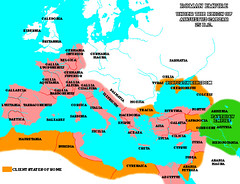The Roman Republic was the period of the ancient Roman civilization characterized by a republican form of government.
It began with the overthrow of the Roman monarchy, says Wikipedia, c. 509 BC, and lasted 482 years until its subversion, through a series of civil wars, into the Principate form of government and the Imperial period.
The Roman Republic was governed by a complex constitution, which centered on the principles of a separation of powers and checks and balances. The evolution of the constitution was heavily influenced by the struggle between the aristocracy (the patricians), and other Romans who were not from famous families, the plebeians.
Early in its history, the republic was controlled by an aristocracy of individuals who could trace their ancestry back to the early history of the kingdom. Over time, the laws that allowed these individuals to dominate the government were repealed, and the result was the emergence of a new aristocracy which depended on the structure of society, rather than the law, to maintain its dominance.
During the first two centuries, the Republic saw its territory expand from central Italy to the entire Mediterranean world. In the next century, Rome grew to dominate North Africa, the Iberian Peninsula, Greece, and what is now southern France. During the last two centuries of the Roman Republic, it grew to dominate the rest of modern France, as well as much of the east. At this point, the republican political machinery was replaced with imperialism.
The precise event which signalled the end of the Roman Republic and the transition into the Roman Empire is a matter of interpretation. Towards the end of the period a selection of Roman leaders came to so dominate the political arena that they exceeded the limitations of the Republic as a matter of course. Historians have variously proposed the appointment of Julius Caesar as perpetual dictator in 44 BC, the defeat of Mark Antony at the Battle of Actium in 31 BC, and the Roman Senate's grant of extraordinary powers to Octavian (Augustus) under the first settlement in 27 BC, as candidates for the defining pivotal event ending the Republic.
Thursday, November 4, 2010
Subscribe to:
Post Comments (Atom)





No comments:
Post a Comment